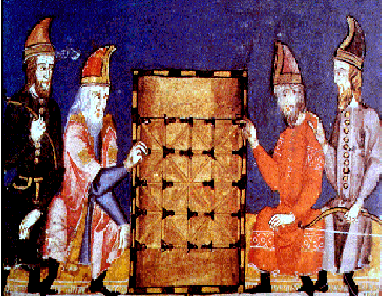
The game illustrated in this detail was introduced into Spain by the Moors, and had already been written about in the 10th century Moorish book Kitab-al Aghani. It is thought that this game had its origins in ancient Egypt and one reference indicates that it may date from about 600bc. The name "Alquerque" is Spanish for the Arabic name "Quirkat" (El-Quirkat).
A number of versions of this game are illustrated in the Libro de Juegos. It was a popular game in various parts of Europe during the Medieval period and other places. For example in the 17th century, a version which is still played, started to appear in Madagascar. The original game is played in Spanish cafes today. Game historians feel that it is an early version of checkers (draughts) and this came about around 1100ad in France. Some inventive person moved the game from the board illustrated in the graphic to the chess board! (see D. Parlett, History of Board Games, Oxford, 1999, Chapter 15.)
The intent of each player is to capture all of the pieces. A player can move through the lines in all directions to adjacent positions. Capture is made by "jumping" over an opponents piece. As in checkers, multiple captures can be made with multiple jumps. It has been suggested that if the players are evenly matched - no one can win; however, the player that starts is at a disadvantage. Detailed instructions for play of the game can be found in R.C. Bell, Board & Table Games from Many Civilizations, Oxford, 1960, page 48.
Last update February 11, 2010